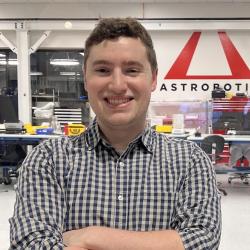Creative Solutions with Computer Science
Junior Andrew Yuan loves building things, from mobile apps to extended reality software.
University of Maryland junior Andrew Yuan, a dual-degree student in mathematics and computer science, swears by three things: practicality, adaptability and creativity.

Over the years, that philosophy helped Yuan create everything from childhood Lego masterpieces to his current computer science project—a mobile app designed to rate UMD campus toilets.
Yuan first developed his creative skills while growing up as the son of a traveling diplomat. Now based in Washington, D.C., Yuan was born in California and later spent six-year spans in Taiwan and Thailand as his father’s international assignments took him from one country to another. During his childhood abroad, Yuan attended different schools, learned unfamiliar languages and adapted to various cultures. For Yuan, every move taught him new ways to ask questions, approach problems and explore solutions.
Looking back, Yuan believes his diverse background also uniquely shaped his dreams and aspirations.
“When I was a kid, I thought that I’d eventually become a mechanical engineer because I loved building stuff,” Yuan explained. “But one day, I realized that I couldn’t always carry around all the physical materials I needed to make my projects; we were moving across literal oceans and continents, so everything had to fit in a suitcase. That’s when I turned to computer science—every tool that I would ever need for my projects was conveniently packaged in my laptop that I could lug around anywhere.”
In 2020, Yuan’s passion for building on the go led him to UMD. Drawn to UMD’s diverse student body and rigorous undergraduate computer science program, Yuan enrolled as a computer science major and soon added a degree in mathematics and a minor in robotics and autonomous systems.
Yuan quickly found multiple opportunities to flex his creative approaches to problem-solving in College Park. As a member of the Quality Enhancement Systems and Teams (QUEST) honors program, he designed a pair of glasses with a frame comprised of four interlocking pieces to help students access cheap, quick and easy eyeglass repairs. For another project, Yuan and his group developed an automated system optimizing UMD RecWell Climbing Wall belay certification processes, helping to ensure safety measures and student access to climbing facilities.
“My initial hunch about UMD was right,” Yuan said. “Being here encouraged me to really be myself—just being fearless about experimenting and trying out new things. And I was lucky to find the support and community here that I needed to achieve both my academic and personal goals.”
Outside of QUEST, Yuan participates in various student organizations across campus. He serves as technical lead for Hack4Impact, which partners undergraduate students with nonprofits seeking inexpensive yet effective technical solutions. Last year, Yuan and his team developed a suite of software applications for 2Unstoppable, an organization that unites women battling against breast cancer through exercise and social support. This semester, Yuan’s group is working to create a program to help Edu-Futuro, a local nonprofit dedicated to helping immigrant families and students achieve academic success.
Yuan, who aims to become a tech professional capable of contributing to an increasingly diverse society, welcomes these opportunities to make a difference.
“When it comes to solving problems, we all have something to contribute from our own unique set of experiences,” Yuan explained. “I believe that this will be how we can identify and fix problems now and moving forward.”
With his eye on the future, Yuan also serves as the treasurer of the UMD XR (Extended Reality) Club, which highlights the emerging fields of virtual and augmented reality (AR). He views the club as a way to stay in touch with his creative side while informing other students—both in computer science and not—about this burgeoning trend in tech.

“XR is starting to show up everywhere, from Google Maps to the new National Geographic King Tut exhibit, which we visited as our first field trip of the semester,” Yuan said. “We’re hoping to demonstrate XR’s potential as a medium for art, exploration and imagination to the Terp community.”
The club welcomes all students to visit its lab on the fourth floor of the A.V. Williams building, where most of its activities and specialized gear are held. In a previous semester, Yuan and the XR Club entered the NASA Spacesuit User Interface Technologies for Students (SUITS) challenge, where they developed an AR interface for astronauts to use in future lunar missions. According to Yuan, the club plans to expand its array of similar hands-on XR software-building opportunities, career development sessions and social programming during the spring semester.
But Yuan’s creative drive doesn’t stop there. He continues to build on the go, lending a distinct personal touch and timely relevance to his projects. His current undertaking, crApp, was inspired by his experience using mobile apps like Yelp and numerous conversations with peers looking for the best restrooms on UMD’s campus. By using Yuan’s mobile app, students can leave anonymous reviews for restrooms at each building, add “favorite” locations and conveniently route directions to the closest and most highly rated stall.
Though graduation is still a year away, Yuan dreams of leading his own startup in the future and venturing into new spaces in tech.
“Building things that can truly help people reach their own goals has helped me carve my path here and something I hope to carry on in all my other endeavors,” Yuan said. “I hope that my diverse background and skill set can continue to help create solutions that’ll address global issues that we all face.”







